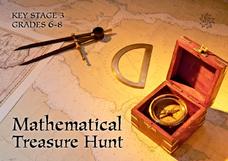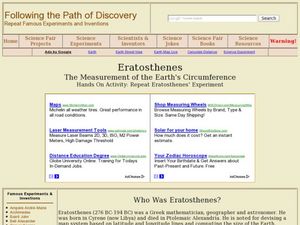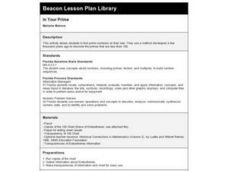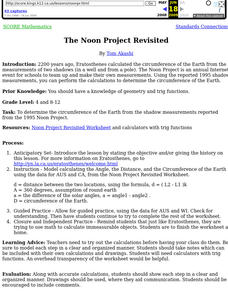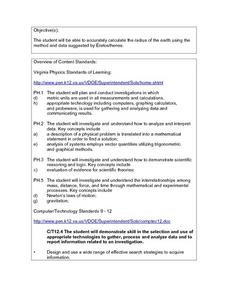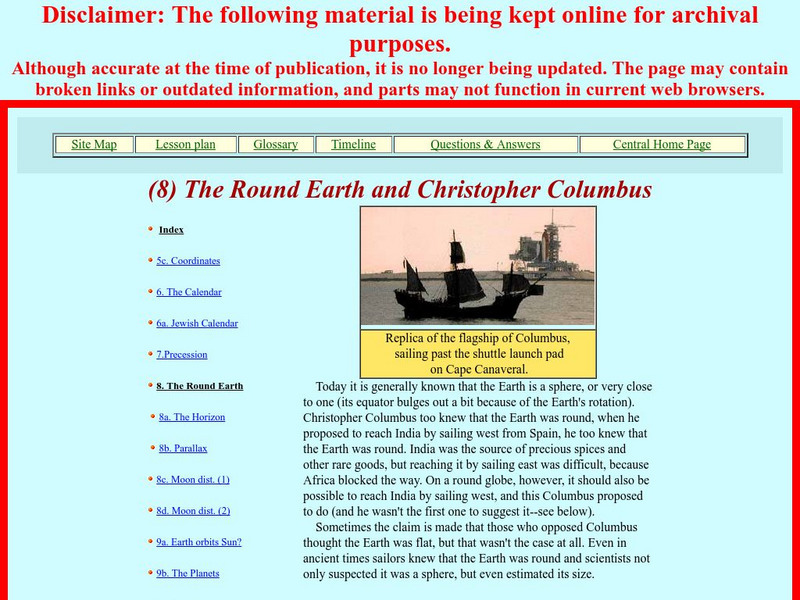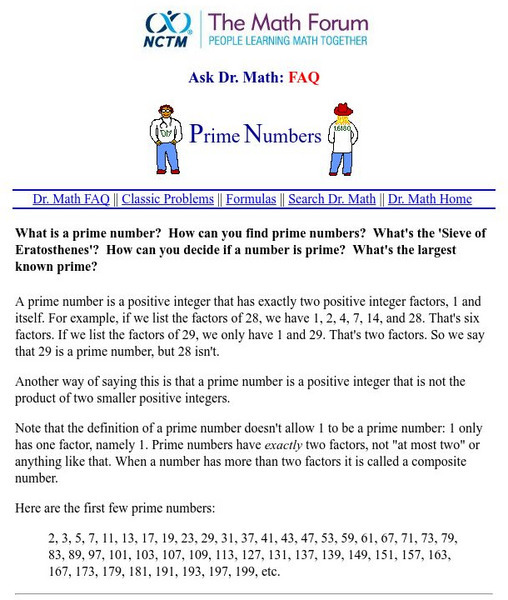Curated OER
Prime Numbers: Eratosthenes' Sieve
By offering a step-by-step explanation of how to identify prime numbers, this presentation would be a terrific way to give learners a visual example of prime numbers. This is a simple, and easy way, for students to understand the "why"...
K12 Reader
Eratosthenes: Geographer and Mathematician
Mathematicians can be famous, too! Introduce your class to Eratosthenes with a reading passage. After they complete the passage, learners respond to five questions, some of which require opinions and others reading comprehension skills.
Curated OER
Mathematical Treasure Hunt
The hunt is on! Young mathematicians follow clues and complete a series of ten math puzzles as they try to crack Dr. Integer's code and find the location of his hidden treasure.
Curated OER
Sieve of Eratosthenes
Students discover the Sieve of Erathosthenes. They explore a method to find all the prime numbers in a group of numbers. Using models, students practice divisibility rules while examining the difference between prime and composite numbers.
Curated OER
Eratosthenes
Students examine what Eratosthenes is and the history behind him. In this earth instructional activity students complete a hands on activity to repeat Eratosthenes' experiment.
Curated OER
Patterns
In this Algebra I worksheet, 9th graders explore number and geometric patterns and use the Sieve of Eratosthenes to find the prime numbers less than one hundred. The six page worksheet contains eight multipart questions. ...
Curated OER
Unit 2: Factors
For this factors worksheet, students identify prime numbers. They use a Sieve of Eratosthenes to identify prime numbers. Students complete factor trees and explore perfect numbers. This factoring unit contains eight...
Curated OER
Number Theory Worksheet 2: The Sieve of Eratosthenes
in this number theory worksheet, learners use the Sieve of Eratosthenes to find all primes up to the number 100. Students follow the directions to circle primes and multiples on the hundred chart.
Curated OER
Number Theory Worksheet 2: The Sieve of Eratosthenes
For this primes and multiples worksheet, students follow the directions to circle primes and multiples on a hundred chart until all prime numbers from 1 to 100 are circled. This is called the Sieve of Eratosthenes.
Curated OER
Eratosthenes And Radius of the Earth
Students calculate the radius of the earth. They use the method and data suggested by Eratosthenes. They investigate the interrelationships among mass, distance, force, and time through experimental processes.
Curated OER
In Your Prime
Students study how to find prime numbers. They investigate the teachings of the mathematician Eratosthenes and apply his theory of prime numbers less than 100.
Curated OER
Prime Real Estate
Students analyze and discuss prime numbers and the Sieve of Eratosthenes, a procedure to sort out prime numbers. They identify the prime numbers from 1-100 by eliminating all the multiples of the first four prime numbers, and circle what...
Curated OER
Noon Project Revisited
Students, just like Eratosthenes, try to use math to calculate immeasurable objects. Teachers need to try out the calculations before having your class do them. They should take notes to be included with their own calculations and drawings.
Curated OER
Looking into Eratosthenes' Radius of the Earth
Students, in small groups, research Eratosthenes and his calculations of the Earth's radius. They write a summary of the person, the experiments and his calculations to determine how accurate Eratosthenes was in his estimations of the...
Curated OER
Prime Hunt On The Internet
Eighth graders find information about primes on the Internet. They use directions for Sieve of Eratosthenes to find primes in the first 100 numbers. After a lecture/demo, 8th graders access a website imbedded in this plan to explore...
University of Utah
University of Utah: Prime Numbers
A discussion of Eratosthenes' development of the system of prime numbers. Includes a Java program that demonstrates the sieve.
University of Oregon
University of Oregon: Greek Science: Early Cosmology
Discusses the evolution of ideas about the cosmos, from the Magic Cosmology of the Neolithic age to the stage of Mythical Cosmology, to the Geometric Cosmology of the ancient Greeks. The third stage advocated a rational approach to...
Other
Alexandria: A Historical Outline
The Hellenic Electronic Center offers extensive information about Alexandria starting with its founding by Alexander to contemporary times. Describes the achievements of the city and its decline because of other sea routes for trade.
NASA
Nasa: From Stargazers to Starships: The Round Earth and Christopher Columbus
Despite popular myth, people of the 15th century actually realized that the earth was round. Some scientists had even estimated the size of the Earth. Here's an interesting explanation from a section of an online textbook on the...
National Council of Teachers of Mathematics
The Math Forum: Elementary Geometry Circles
The Math Forum offers an archive of question and answer sessions on circles and how they relate to geometry.
University of Utah
University of Utah: The Sieve of Eratosthenes
Site gives an explanation of the Sieve of Eratosthenes, a table for prime numbers.
National Council of Teachers of Mathematics
The Math Forum: Prime Numbers
Explains what Prime Numbers are and how to find them. Includes a list of primes under 200 and discusses the Sieve of Eratosthenes. This site has numerous links to other internet sources regarding prime numbers.
TED Talks
Ted: Ted Ed: How Simple Ideas Lead to Scientific Discoveries
Educator, Adam Savage, shares two astounding examples of profound scientific discoveries that came from simple, creative procedures: Eratosthenes' calculation of the Earth's circumference and Hippolyte Fizeau's measurement of the speed...
Ministry of Education and Universities of the Region of Murcia (Spain)
Ministerio De Educacion Y Ciencia: Numeros Primos
This interactive unit explain what prime numbers are and how to find them. It also discuss the Sieve of Eratosthenes and the Mersenne number.




